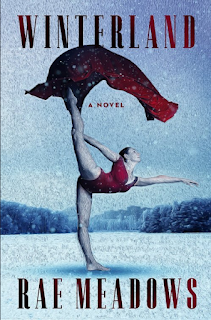Rae Meadows is the author of the new novel Winterland. Her other novels include Will Send Rain, and her work has appeared in a variety of publications, including LitHub and Contexts. She lives in Brooklyn.
Q: What inspired you to write Winterland, and how did you create your character Anya?
A: I was a gymnast as a child and I loved watching the Soviet gymnasts of the ‘70s and ‘80s. That period of gymnastics was like none other, so much grace and style.
And then I read about the gymnast Elena Mukhina, who broke her neck two weeks before the Olympics in Moscow, pushed to do a dangerous skill she wasn’t prepared for, and how the Soviets covered it up. This story made me want to understand the gymnastics system she came out of.
My daughter is a competitive gymnast and although the character of Anya is not based on her, I felt comfortable exploring a child’s experience in the sport. I also like the idea of focusing on the experiences of three different generations of women, and Anya served as a good connector.
Q: How did you research the novel, and did you learn anything that especially surprised you?
A: Researching this novel was so fun, I never wanted it to end! I looked at photographs and read widely about the Soviet Union, pre-revolutionary Russia, the Gulag camps, and even Chernobyl, because to see what happened in that disaster is to see how the USSR worked.
The best part of research was watching old videos of the Soviet gymnasts, both competitions and propaganda films. I could lose myself for hours.
I was surprised to see some video of Elena Mukhina doing poorly in practice, landing on her knees again and again, and her coach looking angry. It seemed antithetical to the usual heroic Soviet ethos to even capture this on film.
Q: How would you compare the Soviet Union you write about to Putin's Russia today?
A: I am no Putin expert but I have heard the phrase “Scratch Putin and you find a Soviet” and it rings true for me. He came of age in the USSR, and recently he has lamented the demise of the Soviet Union and what he has called “historical Russia.” His brand of state control, repression of dissent, and authoritarianism certainly seems rooted in the type of communism that bloomed under Stalin.
Svetlana Alexievich’s books are brilliant in elucidating what it means to be Soviet, and they were very helpful to me in writing the novel. The dissolution of the Soviet Union was 30 years ago, but I have to think there is a cultural memory of that time even for those who were born afterwards. Even American basketball star Brittney Griner being sent to a brutal penal colony harkens back to the forced labor camps of the Gulag.
Q: In her New York Times review of the novel, Megan Abbott writes, “With every cracking bone and snapped ligament, we long for Anya’s success even as it imperils her. We long for her rescue even as we both know that success means buying only a little more time before the end.” What do you think of that description?
A: I love this description because it captures the duality of rooting for Anya, of wanting her to do well in gymnastics, while knowing what it exacts from her body and mind. I think there is a small hope that maybe winning will give something back to her, even though we know better. I’m a sucker for the beauty of these young gymnasts despite myself.
Q: What are you working on now?
A: I’m looking way back and researching a house for virgins in 15th century Florence.
Q: Anything else we should know?
A: I went back to gymnastics in my 40s and I now train three times a week!
--Interview with Deborah Kalb


No comments:
Post a Comment